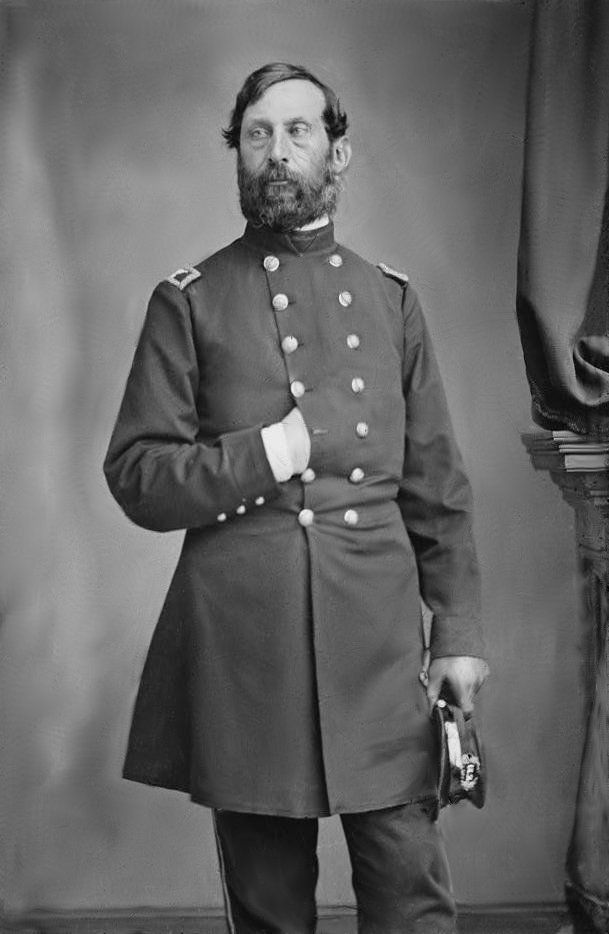Henry Hunt Reflects on the Battle of Chancellorsville

Chancellorsville was a black eye for the Army of the Potomac. But while it no doubt marked the beginning of the end of Joseph Hooker’s stint as army commander, it did not sour the desire for victory among the army’s rank and file. Historian Jeffry Wert described this phenomenon in his study of the Army of the Potomac: it was the common soldier’s “resiliency in the aftermath of another defeat that so defined its character.”
I have seen numerous references to this bounce-back trait of the Army of the Potomac in the wake of its defeat at the hands of Robert E. Lee in May 1863. What seems to be covered in less detail often is the state of mind of the army’s higher echelons of command, which is why the letter of Henry Hunt (reproduced below) that he authored on May 22, 1863, was so interesting to me. With a few exceptions, the letter is reproduced as it was written.
* * * * *
[To ^Brevt.^ Gen. Craig?] #15
Camp. Hd Qrs. May 22. 1863.
My dear Colonel
I received your note informing me of Mary’s departure for Germantown, and one from her reporting her arrival with a head ache, but the babies well. Since that I have not heard from her, but the great irregularity of our mails is enough to account for it.
Mr. Alison made but a short stay with us. He did not succeed I learn in getting young Shields’s body. That as well as his life must be considered in the stakes lost. It is terrible to look upon these things thus, but if ever a gamblers play was made it was on this occasion.
As to the Army, I regret to say that the general feeling, of shame, disgust, and humiliation is well founded I suppose it is very indiscreet to talk thus but it is only to repeat all mens thoughts.
So far as I can judge there is no earthly reason why the whole rebel army should not have been crushed, ruined. I do not despond, that is not my way, but if this army does not at least break down under the weight of madness, folly, imbecility, and intrigue to which it has always been subject and which has heretofore robbed it of the legitimate fruits of its sacrifices, then it will have proved itself the “finest army on the planet.”
Some attempt is made to cast the blame on the 11th Corps. We were strong enough without that Corps which is no part of the ‘old’ Army of the Potomac, but one of Popes legacies. The ‘Potomac’ troops were not effected by the “flying duthcmen,” and they ought not to have been caught as they were. A Fitz John Porter to shoulder the blame has been sought but so far as known, none is yet found. It is thought there was too much preparation for trapping such a character and the trap made a little too obvious. However this army has now lost about 75,000 men since taking the field—that is all—a mere trifle in comparison with the political differences between tweedledum and tweedledee.
As for myself I am waiting to get all of my department in order again. It fell into disgracefull euphoria and disorder for want of a commander, but wherever engaged fought well, and there has been some improvement in its organization since which I hope will do something towards preventing such evils in the future. But its organization since Genl Hooker took command has been wretched—could not possibly have been worse.
John is well. With the exception of a [?] headache I am well also.
With my love to all at home, believe me as ever
Yours truly
H. J. Hunt
Genl Wright has just arrived well.
* * * * *
Great letter. Thanks for sharing.
–Chris Barry
Kevin: Thanks for posting this. A bit of “background” is that – as Hunt indicates – Hunt and Hooker had been in disagreement about the artillery organization, resulting in Hooker reducing Hunt’s role with the Reserve. Chancellorsville made Hunt’s point about centralizing command of the Reserve – such that Fighting Joe gave in after the battle.
Interesting opinions -thanks for posting.
An excellent post! How surprising… another AOP officer convinced that he knows better than his commander and effectively sharing it with a fellow officer.. Whether the criticism is justified or not, there is something continually disturbing about the prima donna quality of the AOP, much like its Confederate counterpart out west. And for those who think that officers’ letters sent in the near immediate aftermath of battle provide insight, they obscure as much as illuminate. Hunt’s is no different. Hooker was operating in a dense woodland without any effective cavalry scouting available. He had unwisely sent them off in a raid eerily prefiguring that of Sheridan during Grant’s Overland Campaign. And secondly, Hunt mentions the search for a scapegoat, noting the actions of the XI Corps (not really part of the AOP!). He ignores the hard pounding Stuart and his artillery gave the II, III and XII Corps on May 3, before they pulled back into a more defensible line. The ultimate irony, however, is that Hooker would be undone by the same backstabbing he had used against Burnsides.